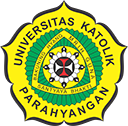Learning Outcomes in Bachelor of Chemistry Education
Learning Outcomes of the Chemistry Education Study Program at FKIP UNPAR is designed to ensure that graduates possess superior competencies in the fields of education and chemistry. These Learning Outcome Achievements (CPL – Capaian Pembelajaran Lulusan) include mastery of chemical concepts, laboratory skills, application of innovative learning methods, and the integration of technology in education. Furthermore, graduates are also equipped with critical thinking abilities, scientific communication skills, as well as professional and ethical attitudes in the world of education and research.
The following is a breakdown of the CPL/ Learning Outcomes that forms the basis for developing the curriculum of the Chemistry Education Study Program:
| Code | No | Learning Outcomes |
|---|---|---|
| Sikap (S) (Attitudes (S)) | 1 | Capable of practicing UNPAR’s Spirituality and basic values (SINDU), faith in God Almighty, and loyalty to Pancasila (S1) |
| 2 | Internalizing the spirit of independence, struggle, and entrepreneurship, while responsibly taking ownership of work in their field of expertise independently and in groups (S2) | |
| Kompetensi Umum (KU)/ General Competencies | 1 | Capable of communicating ideas systematically and creatively, and performing well both independently and interdisciplinarily. (KU1) |
| 2 | Capable of evaluating works of science and art interdisciplinarily based on truth (verum), goodness (bonum), and beauty (pulchrum) (KU2) | |
| 3 | Capable of applying logical, critical, creative, and innovative thinking in solving scientific problems, as well as engaging in self-learning, communicating effectively, and making honest decisions in the context of work and the development of science while considering humanitarian values and scientific ethics(KU3) | |
| Kompetensi Khusus (KK)/ Specific Competencies | 1 | Capable of managing chemistry learning by applying appropriate learning models and technology to optimally develop students’ competencies (KK1) |
| 2 | Capable of facilitating the development of students’ potential in understanding Chemistry Olympiad concepts (KK2) | |
| 3 | Capable of applying information and communication technology in the planning, implementation, and evaluation of learning in chemistry, science, and technology education research (KK3) | |
| 4 | Capable of developing entrepreneurial activities in the field of chemistry education with the principles of subsidiarity and non-profit (KK4) | |
| 5 | Capable of communicating effectively to solve problems optimally and sustainably in the field of chemistry education (KK5) | |
| Pengetahuan (P)/ Knowledge | 1 | Capable of applying creative and cutting-edge technology, pedagogy, and content knowledge (TPACK) in chemistry learning by integrating life skill-oriented learning concepts and principles with a bias towards the poor/marginalized (P1) |
| 2 | Capable of teaching Chemistry Olympiad material to become a leading mentor based on the principle of bonum commune (common good) (P2) | |
| 3 | Capable of presenting research findings honestly and effectively in an effort to find solutions to educational problems faced by society, thereby improving the quality of education (P3) | |
| 4 | Capable of implementing entrepreneurial activities in the field of chemistry education with the principles of subsidiarity, a transformative attitude, and non-profit (P4) | |
| 5 | Mampu mengevaluasi pembelajaran di bidang pendidikan kimia Capable of evaluating learning in the field of chemistry education with a transformative, honest, subsidiary attitude, and a bias towards prioritizing the poor/marginalized in order to improve the quality of education (P5) |

